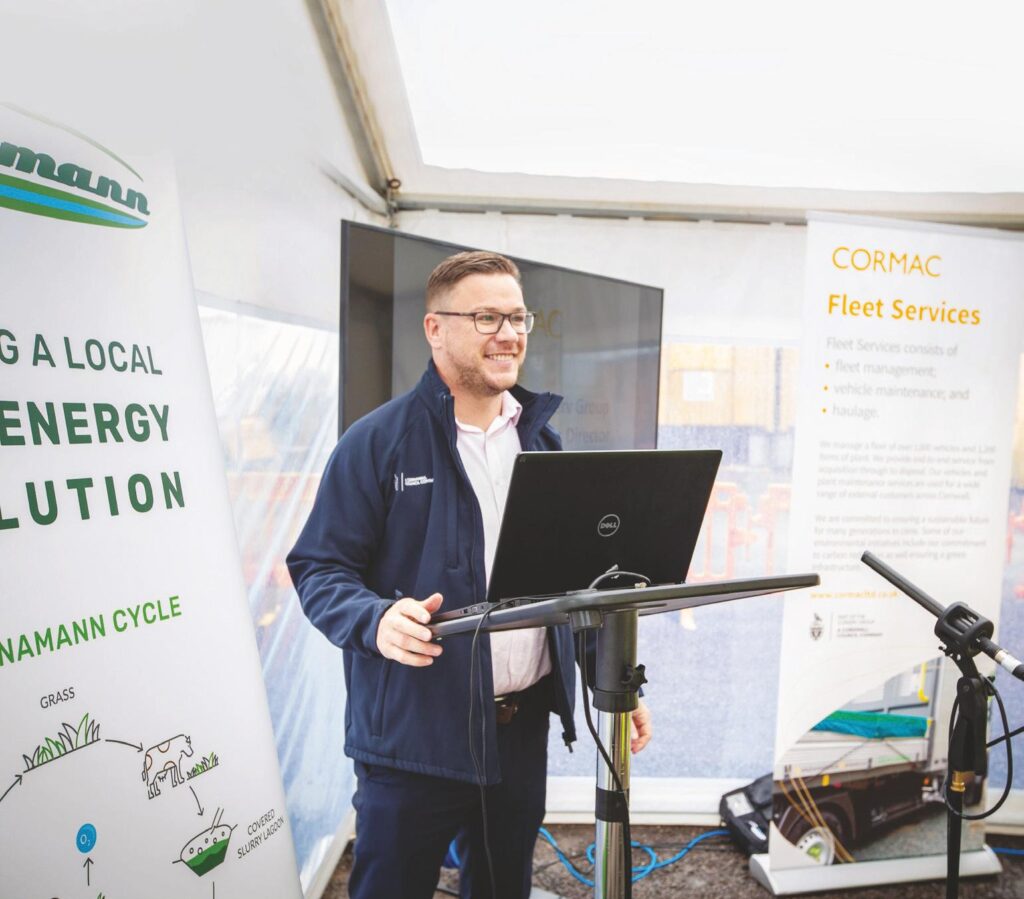Cornwall Council invests £1.58 million in our 6-Farm Pilot with Cormac Biomethane Fuel Supply.
Cornwall Council is combining ambitious plans to introduce renewable fuel sources for its vehicle fleet with our ground-breaking ‘6-Farm Pilot’ project to help boost the future of farming in the county, create more clean energy jobs for residents and support climate change mitigation goals alongside a post-Covid recovery.
In partnership with Cormac, who look after the Council’s fleet of around 1,000 vehicles, and Bennamann, the authority has joined forces with six of its tenant dairy farms across Cornwall in this first-of-a-kind pilot to trial the production, aggregation and sale of biomethane fuel made from cow manure slurry. If successful, the proven model could be rolled out to hundreds of small-scale farms across the county and create significant opportunities for farmers to diversify their income streams, save on operating costs, join the green economy and contribute to helping fight climate change.
The project is part of the Council’s climate change action plan, which aims to help Cornwall become carbon neutral by 2030, and upon announcement of the £1.58m investment Edwina Hannaford, Cornwall Council’s Cabinet Member for Climate Change and Neighbourhoods, said: “As we work on tackling the climate emergency and our Covid recovery this zero-carbon pilot will not only transform our Cormac fleet and cut emissions, it brings investment to our farms and our agricultural and technological sector in Cornwall to create long-term, quality jobs in the green economy. Biomethane could play an important role in helping Cornwall become carbon neutral by 2030 and this new technology developed by an innovative Cornish company will allow small scale farmers to join the growing biomethane market for the first time.”
To highlight this landmark announcement, Cormac together with the Council and Bennamann held a press and media briefing on September 3rd at the fleet provider’s Scorrier Depot, near Redruth in mid-Cornwall. In opening the event, Al Hoare, Corserv’s group central services director responsible for managing the Cormac fleet, said: “Our ambition is to transition our fleet to ultra-low emission vehicles by 2030, supporting one of our key priorities of tackling climate change and increasing sustainability. While testing is still ongoing, this partnership could be a game-changer for Cornwall.” Adding further detail, Al noted that the pilot will produce enough biogas to enable one third of Cormac’s ‘3.5 tonne plus’ fleet of trucks to run on clean, better than zero emissions biomethane, which represents 57 heavy vehicles taken off dirty, polluting diesel fuel. The project is the first step in the Council’s and the Corserv Group’s joint programme to transition towards carbon neutral fleet operations by 2030.

As well as signalling the start of the Council’s transition to running a low emission fleet (which, in the coming months, also includes introducing electric pool cars, piloting electric vans and Fire Service vehicles, and deployment of a new electric bikes scheme for staff), the announcement represents a significant investment for the county in world-leading sustainable agricultural technology that will create more green jobs and boost Cornwall’s post-pandemic economic recovery.

The pilot will involve the installation of Bennamann’s proprietary sealed slurry lagoon based biogas capture technology on six Council-owned dairy farms located across Cornwall (there are 58 dairy farms in the Cornwall Council Farms Estate of 104 tenant farms). The gas captured at each lagoon will be temporarily stored above its surface until processed using a newly developed, highly innovative, mobile version of Bennamann’s novel small-scale ‘Biocycle’ unit. The resulting biomethane will then be aggregated with that produced by the other farms in the pilot group and sold on to Cormac for vehicle fuel, thereby providing a new revenue stream to the Council’s tenant farmers while simultaneously helping the authority achieve its net-zero carbon goals. Further economic benefits will be delivered to the participating farmers through the use of a portion of the biogas produced for on-farm energy supply and application of the digestate from the lagoon to the land as an environmentally friendly, sustainable, fertilizer replacement.
Commenting at the event on this novel ‘closed loop’ business model, the Cabinet’s Deputy Leader Adam Paynter whose portfolio covers Cornwall Council Farms Estate said: “This capital investment in first-of-a-kind, covered, slurry lagoons can provide a commercial return for farmers and enable a rollout across all dairy farms in Cornwall, nationally and potentially globally. Farmers will also benefit from better slurry storage and use, savings on fertiliser and electricity bills.” Cornwall’s portfolio holder for Economy, Culture and Planning, Tim Dwelly, also commented separately that “Green and clean growth and decarbonisation is a key focus in our emerging local recovery planning and our draft Local Industrial Strategy, which has identified agriculture and food as a distinctive opportunity. Our ambition is for Cornwall and the Isles of Scilly to lead on low-impact sustainable farming and fishing to provide a secure and sustainable supply of food produce.”

